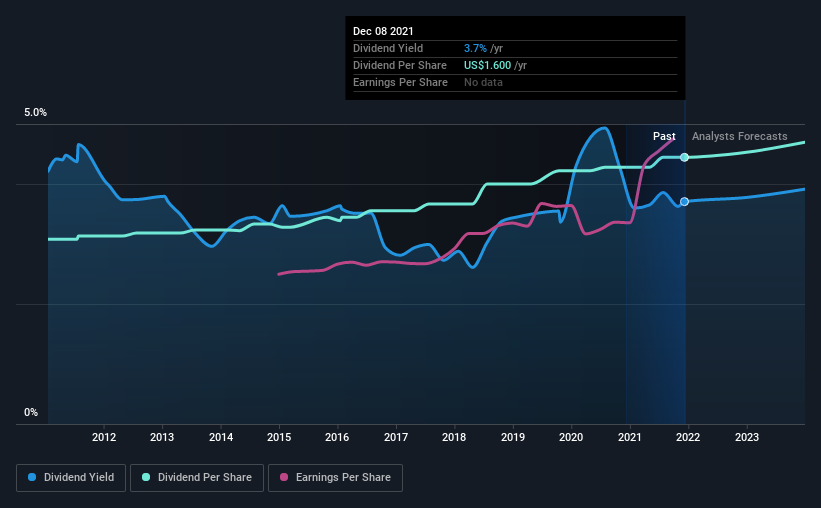Is It Smart To Buy Community Trust Bancorp, Inc. (NASDAQ:CTBI) Before It Goes Ex-Dividend?
It looks like Community Trust Bancorp, Inc. (NASDAQ:CTBI) is about to go ex-dividend in the next four days. Typically, the ex-dividend date is one business day before the record date which is the date on which a company determines the shareholders eligible to receive a dividend. It is important to be aware of the ex-dividend date because any trade on the stock needs to have been settled on or before the record date. Thus, you can purchase Community Trust Bancorp's shares before the 14th of December in order to receive the dividend, which the company will pay on the 1st of January.
The company's next dividend payment will be US$0.40 per share, and in the last 12 months, the company paid a total of US$1.60 per share. Looking at the last 12 months of distributions, Community Trust Bancorp has a trailing yield of approximately 3.7% on its current stock price of $43.17. If you buy this business for its dividend, you should have an idea of whether Community Trust Bancorp's dividend is reliable and sustainable. So we need to check whether the dividend payments are covered, and if earnings are growing.
See our latest analysis for Community Trust Bancorp
Dividends are typically paid from company earnings. If a company pays more in dividends than it earned in profit, then the dividend could be unsustainable. Fortunately Community Trust Bancorp's payout ratio is modest, at just 33% of profit.
When a company paid out less in dividends than it earned in profit, this generally suggests its dividend is affordable. The lower the % of its profit that it pays out, the greater the margin of safety for the dividend if the business enters a downturn.
Click here to see the company's payout ratio, plus analyst estimates of its future dividends.
Have Earnings And Dividends Been Growing?
Companies with consistently growing earnings per share generally make the best dividend stocks, as they usually find it easier to grow dividends per share. If earnings decline and the company is forced to cut its dividend, investors could watch the value of their investment go up in smoke. Fortunately for readers, Community Trust Bancorp's earnings per share have been growing at 12% a year for the past five years.
The main way most investors will assess a company's dividend prospects is by checking the historical rate of dividend growth. In the last 10 years, Community Trust Bancorp has lifted its dividend by approximately 3.7% a year on average. It's good to see both earnings and the dividend have improved - although the former has been rising much quicker than the latter, possibly due to the company reinvesting more of its profits in growth.
The Bottom Line
Is Community Trust Bancorp worth buying for its dividend? Typically, companies that are growing rapidly and paying out a low fraction of earnings are keeping the profits for reinvestment in the business. This strategy can add significant value to shareholders over the long term - as long as it's done without issuing too many new shares. Community Trust Bancorp ticks a lot of boxes for us from a dividend perspective, and we think these characteristics should mark the company as deserving of further attention.
With that in mind, a critical part of thorough stock research is being aware of any risks that stock currently faces. To help with this, we've discovered 2 warning signs for Community Trust Bancorp (1 can't be ignored!) that you ought to be aware of before buying the shares.
We wouldn't recommend just buying the first dividend stock you see, though. Here's a list of interesting dividend stocks with a greater than 2% yield and an upcoming dividend.
Have feedback on this article? Concerned about the content? Get in touch with us directly. Alternatively, email editorial-team (at) simplywallst.com.
This article by Simply Wall St is general in nature. We provide commentary based on historical data and analyst forecasts only using an unbiased methodology and our articles are not intended to be financial advice. It does not constitute a recommendation to buy or sell any stock, and does not take account of your objectives, or your financial situation. We aim to bring you long-term focused analysis driven by fundamental data. Note that our analysis may not factor in the latest price-sensitive company announcements or qualitative material. Simply Wall St has no position in any stocks mentioned.

